Embracing Change
Mount Holyoke women lead in ways big and small
Challenging the status quo—facing, embracing, and leading change—is in our collective DNA at Mount Holyoke, where women were learning to devise their own destinies nearly a century before they even had the right to vote.
Since the College’s founding, each generation of faculty, alumnae, and students has made its mark, fearlessly working to create a world where everyone has the opportunity to thrive. The kind of world Mary Lyon envisioned.
Professor Audrey St. John is among our faculty’s gamechangers, inspiring young women to break into the male-dominated field of computer science and discover its limitless possibilities to transform every aspect of life. NASA space scientist Jennifer Rochlis Zumbado ’94 has made a career of pushing beyond her comfort zone and is opening new frontiers for the rest of us. Student Raquel Silva ’14 of Brazil is a global force for social activism and women’s rights.
These three revel in responsibility, are passionate about their commitments, and are creative in how they get the job done. They—like so many of us who change the world in ways big and small—exemplify the Mount Holyoke ideal.
Fearlessness Can Be Taught
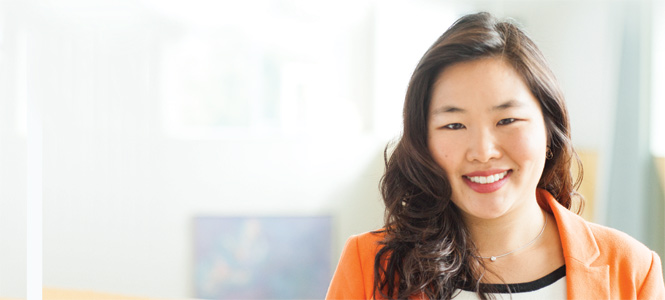 Audrey St. John used to share the same misconceptions about computer science that deter many young women from pursuing the major: It was too hard, nerdy, and isolating. When she overcame her hang-ups about programming, she discovered the truth about the limitless possibilities for computer science to transform every field, from entertainment to healthcare to economics.
Audrey St. John used to share the same misconceptions about computer science that deter many young women from pursuing the major: It was too hard, nerdy, and isolating. When she overcame her hang-ups about programming, she discovered the truth about the limitless possibilities for computer science to transform every field, from entertainment to healthcare to economics.
Now Audrey, as her devoted students universally refer to the Clare Boothe Luce Assistant Professor of Computer Science, is on a mission to empower Mount Holyoke students with the technical know-how—and confidence—to change the world.
This is going to be hard, but it’ll be worth it.
Professor Audrey St. John
Once captivated, students learn that writing code is not that difficult, St. John says. Of course, as the majors move on to higher-level courses and research projects, the challenges increase, and so do St. John’s expectations. “This is going to be hard, but it’ll be worth it,” she assures her students when assigning them a new set of problems or insisting they join her as copresenters at an academic conference. They never disappoint her. “Mount Holyoke students seem to trust that the things I’m forcing them to do may be uncomfortable but will help them achieve their long-term goals,” she says. “The only thing I have to be concerned about is letting them overwork themselves.”The professor has found increasingly creative ways to attract students by making computer science more accessible to creative women who don’t fit the stereotype: less geek and more chic. Students in her first-year seminar called iDesign Studio explore and design wearable electronics. She is the advisor to the annual GameJam, which brings together students from the Five Colleges with a local video game developer to produce original games. Her IHart (Interactive Hallways for attraction and retention to technology) project has resulted in such innovations as a playable piano poster, complete with audio. And then there’s the 3D printer she and students built.
Milka Doktorova ’10, who is in a tri-institutional PhD program in computational biology and medicine shared among Cornell University, Weill Cornell Medical College, and Memorial Sloan-Kettering Cancer Center, credits St. John with much of her current success. “She was a perfectionist and taught me how to think critically, pay attention to details, and do good work. She was very supportive and at the same time, kept pushing me forward.”
In the rapidly evolving field of computer science, St. John knows she can’t teach her students everything before they graduate—except for this: “I want my students to have the confidence, when they confront new material, to say, ‘I don’t know it, but I can learn it.’”
Mission Most Possible
The year was 1983, and ten-year-old Jennifer Rochlis Zumbado ’94 saw something on the television screen that seemed to broadcast her future: Astronaut Sally Ride became the first American woman in space.
Zumbado set her sights on the stars, and, having earned a PhD in aeronautics from MIT, her career has skyrocketed at NASA Johnson Space Center in Houston. Her work on a robot astronaut, the next generation of lunar and Martian rovers, and other telerobotics projects earned her a Director’s Innovation Award from the center. Her expertise in how humans function in space led to her current dual leadership positions as both the manager for NASA’s Human Research Program space human factors and habitability element and NASA’s Human Health and Performance Division lead for SpaceX in the Commercial Crew Program. SpaceX is a private company competing against two other corporations, all under NASA’s aegis, to relaunch America’s human spaceflight activities.
I’ve always been one to take opportunities when they come and not be afraid to stick my neck out.
Jennifer Rochlis Zumbado ’94
In the end, it wasn’t her two surgeries and radiation treatment that kept her from making the final cut, but her lack of actual mission operations experience. “I was very much at peace with that decision because I’d done everything I could,” she says, adding that she still plans to pursue an opportunity to venture beyond planet Earth one day. “I’ve always been one to take opportunities when they come and not be afraid to stick my neck out,” says Zumbado, who has also persistently pursued her goal of going to space since she was in grad school. In 2004, she came very close as one of only twelve female finalists out of 3,000 seriously considered for the position of mission specialist for NASA’s 2004 astronaut class. In 2010, at age thirty-seven, she was diagnosed with early-stage breast cancer. Despite reassurance from her friend Wendy Woodward ’93, a radiation oncologist in Houston, that she would be okay, Zumbado recalls, “I was inconsolable.” She thought she would be disqualified from the following round of astronaut applications. But the next time, she was among 100 people interviewed out of 6,100 applicants.
Zumbado’s commitment to mentoring young people seems as limitless as her talent and ambition. “Fail early and fail often,” she often tells students. “You learn from your mistakes; you learn how to get better.” She says her personal life motto is “The answer is always ‘no’ if you don’t ask” and adds, “My professors at Mount Holyoke would confirm this.”
When visiting schools to give talks and workshops, she makes a point never to wear the standard khakis and NASA polo, opting instead for business attire. “Stereotypes start early,” she explains, laughing about how kids always seem surprised to see a rocket scientist who wears makeup and stylishly long straight hair.
One particular presentation at an elementary school stays with her. The students treated her like a rock star, cheering and clamoring for her autograph. One eight-year-old girl gingerly approached her and confided, “I love robots, but I could never be as smart as you.” Zumbado leaned down, looked deeply into her eyes, and said, “I don’t know where you get your messages from, but I’m telling you, if you stay focused and work hard, you can do anything you want.”
Global Force for Good
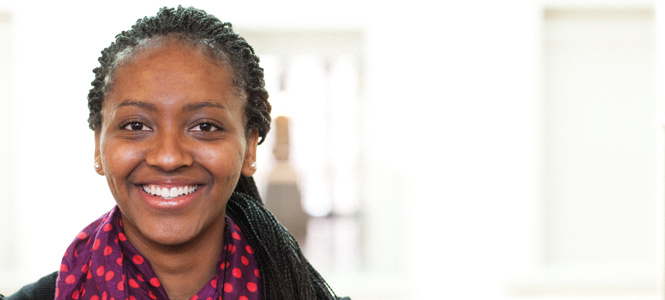 Raquel Silva ’14 was the first in her family to leave the country when she took off for Mount Holyoke, far from her home in Belo Horizonte, Brazil. Both her parents died when she was a toddler, but she and her sister were lovingly raised by their maternal grandmother and three aunts to pursue their education, wherever it may take them. “They made us understand that we were lucky, even though this unfortunate thing had happened, because we had a family and a home and food, and lots of people didn’t have that,” she says.
Raquel Silva ’14 was the first in her family to leave the country when she took off for Mount Holyoke, far from her home in Belo Horizonte, Brazil. Both her parents died when she was a toddler, but she and her sister were lovingly raised by their maternal grandmother and three aunts to pursue their education, wherever it may take them. “They made us understand that we were lucky, even though this unfortunate thing had happened, because we had a family and a home and food, and lots of people didn’t have that,” she says.
In her hometown, Silva mentored younger children, spearheaded a recycling effort, and cheered up pediatric patients enduring stays in the hospital, learning that “even when you’re young and don’t have much, you still have so much to give.”
I’ve never been afraid of asking questions.
Raquel Silva ’14
As a member of the British Council Global Changemakers Program, she made a presentation about the React and Change Youth for Empowerment Forum at the 2011 World Economic Forum annual meeting. She was Brazil’s delegate to the 2011 G(irls)20 Summit and was selected by the US State Department to personally introduce First Lady Michelle Obama when she visited her country. Since arriving at Mount Holyoke, she has metamorphosed into a strong advocate for women’s rights and social change who has traveled far beyond even her highest expectations. Silva—who is fluent in English and her native Portuguese and also speaks French—has traveled to England, France, and Switzerland. She spent most of this past July and August in Accra, Ghana, on an internship with the African Women’s Development Fund.
“Public speaking always makes me nervous,” confides Silva, although she even gave a TEDx talk last year. She’s learned to push through her fear, relying on strong preparation and practice sessions with an array of helpful professionals, including White House staff. “In these situations I have been fortunate to be surrounded by women, and that helps because women have that instant connection,” she adds.
Opportunities afforded her through Mount Holyoke, such as the summer internship in Ghana, have forced Silva to navigate new, often intimidating terrain. “I’ve never been afraid of asking questions,” she says, explaining her ability to adapt. At this point, Silva’s biggest fear is not living up to her own ambitions. That seems unlikely, given her determination and drive. “I want to do everything, and hug the world, and accomplish so much,” she affirms. “I have to remind myself to find a good balance and spend my time wisely.”
—Written by Kim Asch
—Photos by John Dolan
This article appeared in the fall 2013 issue of the Alumnae Quarterly
November 5, 2013


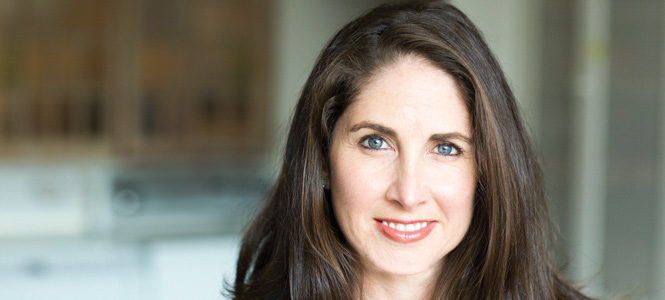





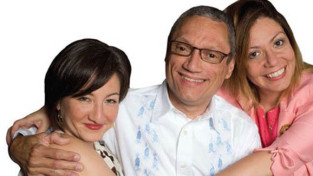
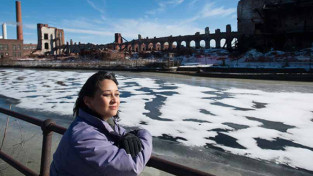
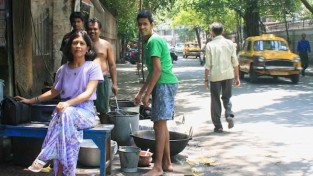
Leave a Reply